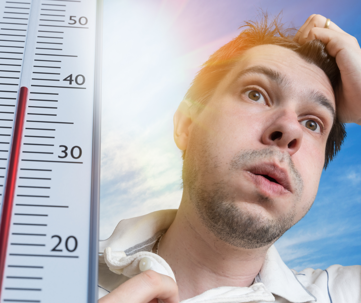When thinking about extreme and deadly weather, some people conjure up images of massive tornadoes in the Midwest or hurricanes and flooding in the Southeast. But you might be surprised to learn that the deadliest extreme weather event is excessive heat. In fact, according to a study from the National Oceanic and Atmospheric Administration (NOAA), heat causes more deaths each year than floods, lightning, tornadoes, and hurricanes combined. Here is a quick overview of what you need to know about heat related illnesses and how to prevent them, along with links to more information.
Heat-Related Illnesses and Risk Factors
According to the Centers for Disease Control and Prevention (CDC), heat-related illnesses are caused by “exposure to extreme heat where the body becomes unable to properly cool, resulting in a rapid rise in body temperature.” There are several kinds of heat-related illnesses. The least severe are heat rashes, sunburn, and heat cramps, and the most serious are heat exhaustion and heat stroke. While anyone can experience these illnesses if they overexert themselves in hot weather, some groups are more at risk than others, including:
• Children under the age of 4 and adults over the age of 65
• People with preexisting medical conditions, such as diabetes or heart disease
• People who are overweight
• People taking certain kinds of medication
• Individuals who are intoxicated or drink excessively
Symptoms to Watch For
Both heat exhaustion and heat stroke have many of the same symptoms, including headaches, dizziness, nausea or vomiting, and passing out. But other symptoms help differentiate the two. Heat stroke victims will have hot, red skin that may be dry or damp, and they’ll likely have a fast, strong pulse. By contrast, victims of heat exhaustion will have cold, pale, and clammy skin and a fast but weak pulse.
Heat stroke is a medical emergency requiring professional medical attention immediately. You should also seek medical help for anyone exhibiting the above symptoms who is also throwing up, or whose symptoms are getting worse or last longer than one hour. For a complete list of symptoms and more information on treatment for all heat-related illnesses, visit the following links:
https://www.cdc.gov/extreme-heat/media/pdf/Heat_Related_Illness.pdf
Stay cool and stay safe this summer by learning and following these guidelines from the CDC!

